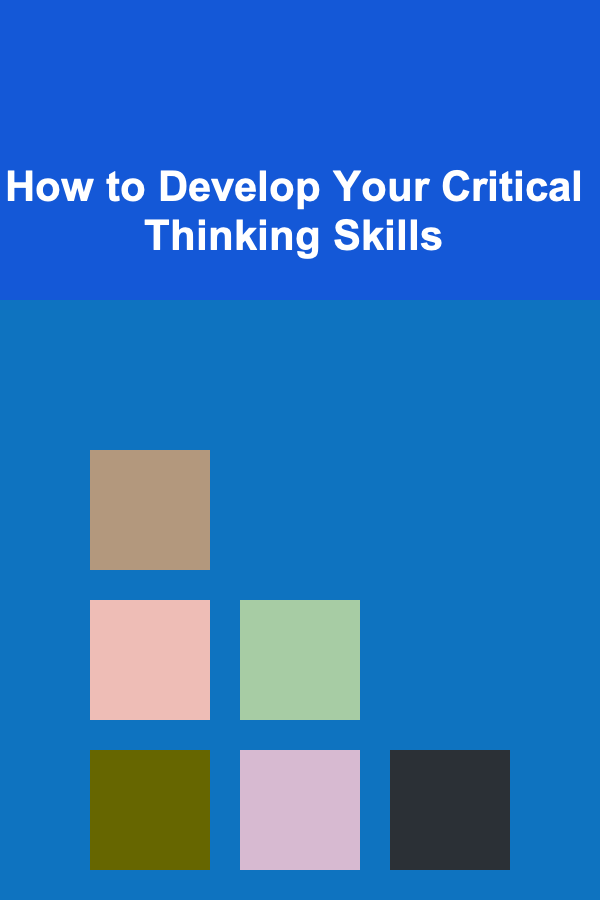
How to Develop Your Critical Thinking Skills
ebook include PDF & Audio bundle (Micro Guide)
$12.99$9.99
Limited Time Offer! Order within the next:

In an increasingly complex and information-saturated world, critical thinking skills are more vital than ever. They are the bedrock upon which sound judgments are made, effective decisions are reached, and innovative solutions are conceived. Critical thinking isn't simply about accumulating knowledge; it's about actively processing, analyzing, and evaluating information to form your own informed opinions and conclusions. This article delves into the multifaceted nature of critical thinking and provides actionable strategies for honing this essential skill.
Understanding Critical Thinking
Critical thinking is a cognitive process that involves analyzing, evaluating, interpreting, and synthesizing information to form a reasoned judgment. It's more than just recalling facts; it's about understanding the underlying assumptions, biases, and perspectives that shape information. It's about being able to identify arguments, assess their validity, and construct your own well-reasoned arguments. Critical thinking enables us to:
- Solve problems effectively: By analyzing the root causes and potential solutions.
- Make informed decisions: By evaluating the available evidence and weighing the pros and cons.
- Understand diverse perspectives: By recognizing and appreciating different viewpoints.
- Communicate clearly and persuasively: By constructing logical arguments and supporting them with evidence.
- Adapt to new situations: By thinking flexibly and creatively.
Essentially, critical thinking empowers you to be an active participant in your own learning and decision-making, rather than a passive recipient of information.
The Core Components of Critical Thinking
Developing strong critical thinking skills requires understanding and cultivating its core components. These components are interconnected and work together to enable effective reasoning and analysis.
Analysis
Analysis is the ability to break down complex information into smaller, more manageable parts. It involves identifying the key elements, relationships, and underlying assumptions. This allows you to understand the structure of an argument, the different perspectives involved, and the potential biases that might be present. Effective analysis often involves asking probing questions:
- What are the main ideas being presented?
- What evidence is being used to support these ideas?
- What assumptions are being made?
- What are the potential biases of the source?
By rigorously analyzing information, you can avoid accepting it at face value and begin to understand its deeper meaning and implications.
Evaluation
Evaluation goes beyond simply understanding the information; it involves assessing its credibility, validity, and relevance. This requires questioning the source of the information, examining the evidence presented, and considering alternative interpretations. Key questions to ask during evaluation include:
- Is the source credible and reliable?
- Is the evidence accurate and unbiased?
- Are there any logical fallacies in the argument?
- Are there alternative explanations for the evidence?
Evaluating information critically allows you to distinguish between facts and opinions, identify potential biases, and make informed judgments about the validity of claims.
Interpretation
Interpretation involves understanding the meaning and significance of information within its context. It requires considering the broader implications and potential consequences of different interpretations. This also involves being aware of your own biases and assumptions and how they might influence your understanding. Consider these questions:
- What is the context in which this information is presented?
- What are the potential implications of this information?
- What are my own biases and assumptions?
- How might different people interpret this information differently?
Accurate interpretation is crucial for understanding the nuances of complex issues and avoiding misinterpretations.
Inference
Inference is the ability to draw logical conclusions based on the available evidence. It involves going beyond the explicitly stated information to infer hidden meanings and potential implications. This requires careful analysis of the evidence and consideration of alternative possibilities. Useful questions to guide inference include:
- What conclusions can be drawn from the evidence?
- What are the potential implications of these conclusions?
- Are there any alternative explanations for the evidence?
- What further information is needed to confirm these conclusions?
Making accurate inferences allows you to see beyond the surface and understand the underlying meaning of information.
Explanation
Explanation involves being able to clearly and concisely communicate your understanding of complex information to others. This requires organizing your thoughts logically, using clear and precise language, and providing supporting evidence for your claims. Effective explanation involves:
- Clearly stating your main points.
- Providing supporting evidence for your claims.
- Using clear and precise language.
- Organizing your thoughts logically.
- Anticipating and addressing potential objections.
Being able to explain your reasoning to others demonstrates a deep understanding of the subject matter and strengthens your ability to think critically.
Self-Regulation
Self-regulation is the ability to monitor your own thinking processes and identify potential biases or errors in reasoning. It involves being aware of your own strengths and weaknesses as a thinker and taking steps to improve your skills. This requires introspection and a willingness to challenge your own assumptions. Questions to ask yourself are:
- What are my own biases and assumptions?
- What are my strengths and weaknesses as a thinker?
- How can I improve my thinking skills?
- Am I being objective in my analysis?
Self-regulation is essential for continuous improvement in critical thinking skills.
Practical Strategies for Developing Critical Thinking Skills
Developing critical thinking is an ongoing process that requires consistent effort and practice. The following strategies offer practical ways to cultivate these crucial skills.
1. Ask Questions Constantly
Questioning is the foundation of critical thinking. Never accept information at face value. Instead, challenge assumptions, explore alternative perspectives, and seek evidence to support claims. Practice asking "why," "how," and "what if" questions to deepen your understanding. For example, instead of simply accepting a news headline, ask:
- Who is reporting this? What is their agenda?
- What evidence supports this claim?
- What are the potential biases in this report?
- Are there alternative interpretations of these events?
By questioning everything, you force yourself to think critically about the information you encounter.
2. Analyze Arguments
Develop the ability to identify and analyze arguments. This involves identifying the premises, conclusions, and underlying assumptions. Look for logical fallacies, such as ad hominem attacks, straw man arguments, and appeals to emotion. Understanding how arguments are constructed allows you to evaluate their validity and effectiveness.
Consider this example:
Statement: "My opponent wants to increase taxes, which will destroy the economy."
Analysis: This statement contains several potential fallacies. It's a slippery slope argument (assuming that increasing taxes will inevitably lead to economic destruction) and a straw man argument (misrepresenting the opponent's position). It's important to examine the opponent's actual tax proposals and the potential economic impact before accepting this claim.
3. Seek Out Diverse Perspectives
Expose yourself to a variety of viewpoints and opinions. Read books, articles, and blogs from different perspectives. Engage in discussions with people who hold different beliefs. This will help you broaden your understanding of complex issues and challenge your own assumptions. Actively seek out sources that challenge your pre-existing beliefs. This can be uncomfortable, but it's essential for intellectual growth.
4. Practice Active Reading and Listening
Active reading and listening involve engaging with information in a thoughtful and purposeful way. Take notes, highlight key passages, and summarize the main points. Ask yourself questions about the material and try to connect it to what you already know. When listening to someone speak, pay attention to their body language, tone of voice, and the evidence they present. Don't just passively absorb information; actively process it.
5. Engage in Debates and Discussions
Participating in debates and discussions is a great way to hone your critical thinking skills. It forces you to articulate your own position, defend it against opposing arguments, and consider alternative perspectives. Look for opportunities to debate with friends, family, or colleagues. Even if you don't agree with the other person, try to understand their point of view and find common ground. Remember to focus on the argument, not the person.
6. Play Logic Games and Puzzles
Games and puzzles that require logical reasoning can help you develop your critical thinking skills in a fun and engaging way. Sudoku, crossword puzzles, chess, and other strategy games can all sharpen your analytical skills and problem-solving abilities. These games often require you to think ahead, anticipate consequences, and consider multiple possibilities.
7. Write Regularly
Writing is a powerful tool for developing critical thinking skills. It forces you to organize your thoughts, clarify your ideas, and present your arguments in a logical and coherent manner. Practice writing essays, reports, or even just journaling regularly. The more you write, the better you will become at articulating your thoughts and reasoning effectively.
8. Reflect on Your Thinking
Take time to reflect on your own thinking processes. Ask yourself what assumptions you are making, what biases you might have, and how you could improve your reasoning. Keep a journal of your thoughts and feelings, and review it regularly to identify patterns and areas for improvement. Self-reflection is essential for continuous growth as a critical thinker.
9. Be Aware of Cognitive Biases
Cognitive biases are systematic patterns of deviation from norm or rationality in judgment. Understanding these biases is crucial for mitigating their impact on your thinking. Some common cognitive biases include:
- Confirmation Bias: The tendency to seek out information that confirms your existing beliefs and ignore information that contradicts them.
- Anchoring Bias: The tendency to rely too heavily on the first piece of information you receive, even if it's irrelevant.
- Availability Heuristic: The tendency to overestimate the likelihood of events that are easily recalled, even if they are rare.
- Halo Effect: The tendency to form a positive impression of someone based on a single positive trait.
By being aware of these biases, you can take steps to mitigate their influence and make more objective judgments.
10. Seek Feedback
Ask for feedback from trusted friends, family members, or colleagues. They can offer valuable insights into your thinking and identify areas where you could improve. Be open to constructive criticism and willing to learn from your mistakes. Remember that feedback is a gift that can help you grow as a critical thinker.
The Importance of Intellectual Humility
Central to critical thinking is the concept of intellectual humility. This doesn't mean being uncertain or lacking confidence, but rather possessing an awareness of the limits of one's own knowledge and understanding. Intellectually humble individuals are open to being wrong, willing to consider alternative perspectives, and eager to learn from others. They understand that knowledge is constantly evolving, and they are committed to lifelong learning. Without intellectual humility, critical thinking can become rigid and dogmatic, hindering the ability to adapt to new information and perspectives.
Critical Thinking in the Digital Age
The digital age presents both opportunities and challenges for critical thinking. On one hand, we have access to an unprecedented amount of information at our fingertips. On the other hand, we are constantly bombarded with misinformation, propaganda, and fake news. Developing critical thinking skills is essential for navigating this complex information landscape. This includes being able to:
- Identify credible sources of information. Look for sources that are transparent, objective, and have a reputation for accuracy.
- Evaluate the evidence presented. Is the evidence based on facts, opinions, or speculation? Is it supported by credible sources?
- Be aware of algorithms and filter bubbles. Algorithms can create filter bubbles that reinforce your existing beliefs and limit your exposure to diverse perspectives. Actively seek out different viewpoints to break free from these bubbles.
- Be skeptical of sensational headlines and clickbait. These tactics are often used to attract attention and spread misinformation.
- Fact-check information before sharing it. Don't contribute to the spread of misinformation.
Conclusion
Developing critical thinking skills is an investment in your future. It empowers you to make informed decisions, solve problems effectively, and navigate the complexities of the modern world. It requires consistent effort, a willingness to challenge your own assumptions, and a commitment to lifelong learning. By incorporating the strategies outlined in this article into your daily life, you can cultivate your critical thinking skills and unlock your full potential.

How to Limit Meetings to Make the Most of Your Time
Read More
How to Soundproof Your Windows for a Quieter Home
Read More
How to Use LED Lights for Energy-Efficient Home Lighting
Read More
Why You Need to Set Goals for Home Organization Projects
Read More
How To Create Child-Led Learning Opportunities
Read More
How to Integrate Disability Insurance into Your Overall Budget
Read MoreOther Products

How to Limit Meetings to Make the Most of Your Time
Read More
How to Soundproof Your Windows for a Quieter Home
Read More
How to Use LED Lights for Energy-Efficient Home Lighting
Read More
Why You Need to Set Goals for Home Organization Projects
Read More
How To Create Child-Led Learning Opportunities
Read More